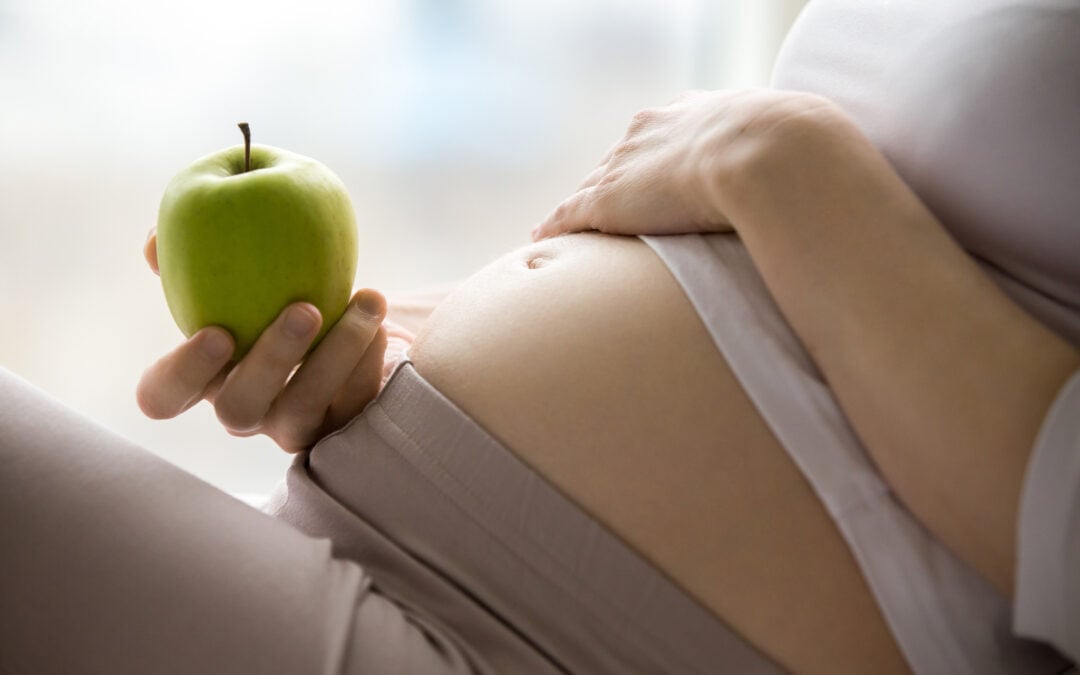Pregnancy can bring many wonderful new joys to an expectant mother’s life.
Pregnancy gingivitis is not one of them.
The shocking truth is that pregnancy gingivitis affects anywhere from 50 to 70 percent of pregnant women. And those with the disease are 7 times more likely to go into preterm labor, preeclampsia and have low-birth-weight babies! Premature infants are at greater risk for short and long-term complications, including disabilities and impediments in growth and mental development. Additionally, if an expectant mom had untreated tooth decay and/or consumed a lot of sugar, their children have 4 times the risk of developing tooth decay.
What is pregnancy gingivitis
Pregnancy gingivitis is characterized by swelling/inflammation of the gums and is caused by a bacterial film that grows on the teeth, resulting in plaque buildup. This plaque irritates the gum tissue, making them tender, bright red, swollen, sensitive, and easy to make bleed. These infected and swollen gums harbor disease-causing bacteria. The bacteria release toxins that can attack ligaments, gums, and bones surrounding your teeth to create infected pockets similar to large infected wounds in the oral cavity. These pockets provide access to your bloodstream and allow bacteria to travel throughout your body. Since the bacteria that cause gingivitis can enter the bloodstream, they are able to travel down to the uterus. This triggers the body to produce prostaglandins, which is a natural fatty acid that normally controls inflammation and smooth muscle contraction. When a woman is pregnant, her level of prostaglandins increases, and peaks when she goes into labor. It is possible that if there is extra prostaglandins in the body reacting to infected gums, a pregnant woman’s body may think it is a signal to go into labor sooner than expected, thus causing a baby to be born too early.
Ultimately then, hormonal changes during pregnancy affect the body’s natural response to dental plaque. It affects how gum tissues react to the bacteria in plaque, thus resulting in a higher chance of pregnant women getting gingivitis. Moreover, if you already have gingivitis going into a pregnancy, it will likely get worse during pregnancy if you do not seek treatment. Although the gingivitis generally subsides shortly after birth, it should nonetheless be periodically monitored by your dentist. Regular check-ups (during and after pregnancy) are important in order to prevent the gingivitis from turning into the more serious (and irreversible) form of periodontitis.
The following are guidelines suggested by the American Academy of Pediatrics (AAP), in response to the increased concern about oral health during pregnancy:
1) Oral Health Education
DO have consultations with your dentist before, during, and after your pregnancy. Early intervention is key, but ongoing care is just as important!
2) Oral Hygiene
DO brush and floss regularly – and properly. It is especially important to try and always brush after meals and snacks, especially sugary ones. Also, have more frequent dental cleanings than you normally would (2-3 during your pregnancy is about right). This will greatly increase the amount of plaque that is removed from the teeth and gums, thereby lowering your risk.
3) Nutrition
DON’T eat junk. This is good advice in general during your pregnancy. But just know that proper diet and nutrition during pregnancy will limit sugar intake which, in turn, will minimize plaque buildup.
4) Treat Tooth Decay
DO try and have all urgent dental work completed prior to becoming pregnant. It is safe to perform certain emergency dental procedures during your pregnancy. But it is best to complete it prior to becoming pregnant, and especially prior to it becoming an emergency dental treatment!
5) Transmission of Bacteria
DON’T share food and utensils, so as not to potentially transmit bacteria that cause tooth decay.
6) Use of Xylitol Gum
DO chew gum. It is good for expectant mothers and everyone else to chew xylitol gum (around 4x/day). Research suggests that it may decrease the rate of tooth decay. Chewing sugarless gum increases saliva and thus increases the production of salivary enzymes that help equalize the Ph in the mouth and thus reduce cavity growth.
To sum up, pregnancy gingivitis is a real and prevalent threat. But, so long as you take the appropriate steps, it is manageable with relative ease. Good luck with your pregnancy!
Schedule a check-up at Vaksman Dental Group in South San Francisco to take care of your oral health during pregnancy.

